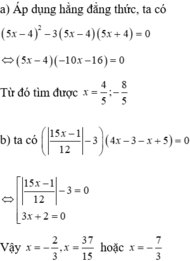Giải các phương trình sau:
a) 5 x − 4 2 + 3 16 − 25 x 2 = 0
b) 4 x − 3 15 x − 1 12 − 3 = 15 x − 1 12 − 3 x − 5 .
Hãy nhập câu hỏi của bạn vào đây, nếu là tài khoản VIP, bạn sẽ được ưu tiên trả lời.



a) \(2{x^2} + 3x + 1 \ge 0\)
Tam thức bậc hai \(f\left( x \right) = 2{x^2} + 3x + 1\) có 2 nghiệm phân biệt \(x = - 1,x = \frac{{ - 1}}{2}\)
hệ số \(a = 2 > 0\)
Ta có bảng xét dấu f(x) như sau:

Từ bảng xét dấu ta thấy \(f\left( x \right) \ge 0 \Leftrightarrow \left[ \begin{array}{l}x \le - 1\\x \ge - \frac{1}{2}\end{array} \right.\)
Vậy tập nghiệm của bất phương trình là \(\left( { - \infty ; - 1} \right] \cup \left[ { - \frac{1}{2}; + \infty } \right)\)
b) \( - 3{x^2} + x + 1 > 0\)
Tam thức bậc hai \(f\left( x \right) = - 3{x^2} + x + 1\) có 2 nghiệm phân biệt \(x = \frac{{1 - \sqrt {13} }}{6},x = \frac{{1 + \sqrt {13} }}{6}\)
Hệ số \(a = - 3 < 0\)
Ta có bảng xét dấu f(x) như sau:

Từ bảng xét dấu ta thấy \(f\left( x \right) > 0\)\( \Leftrightarrow \frac{{1 - \sqrt {13} }}{6} < x < \frac{{1 + \sqrt {13} }}{6}\)
Vậy tập nghiệm của bất phương trình là \(\left( {\frac{{1 - \sqrt {13} }}{6};\frac{{1 + \sqrt {13} }}{6}} \right)\)
c) \(4{x^2} + 4x + 1 \ge 0\)
Tam thức bậc hai \(f\left( x \right) = 4{x^2} + 4x + 1\) có nghiệm duy nhất \(x = \frac{{ - 1}}{2}\)
hệ số \(a = 4 > 0\)
Ta có bảng xét dấu f(x) như sau:

Từ bảng xét dấu ta thấy \(f\left( x \right) \ge 0 \Leftrightarrow x \in \mathbb{R}\)
Vậy tập nghiệm của bất phương trình là \(\mathbb{R}\)
d) \( - 16{x^2} + 8x - 1 < 0\)
Tam thức bậc hai \(f\left( x \right) = - 16{x^2} + 8x - 1\) có nghiệm duy nhất \(x = \frac{1}{4}\)
hệ số \(a = - 16 < 0\)
Ta có bảng xét dấu f(x) như sau:

Từ bảng xét dấu ta thấy \(f\left( x \right) < 0 \Leftrightarrow x \ne \frac{1}{4}\)
Vậy tập nghiệm của bất phương trình là \(\mathbb{R}\backslash \left\{ {\frac{1}{4}} \right\}\)
e) \(2{x^2} + x + 3 < 0\)
Ta có \(\Delta = {1^2} - 4.2.3 = - 23 < 0\) và có \(a = 2 > 0\)
Sử dụng định lí về dấu của tam thức bậc hai, ta thấy tập hợp những giá trị của x sao cho \(2{x^2} + x + 3\) mang dấu “-” là \(\emptyset \)
Vậy tập nghiệm của bất phương trình \(2{x^2} + x + 3 < 0\) là \(\emptyset \)
g) \( - 3{x^2} + 4x - 5 < 0\)
Tam thức bậc hai \(f\left( x \right) = - 3{x^2} + 4x - 5\) có \(\Delta ' = {2^2} - \left( { - 3} \right).\left( { - 5} \right) = - 11 < 0\) và có \(a = - 3 < 0\)
Sử dụng định lí về dấu của tam thức bậc hai, ta thấy tập hợp những giá trị của x sao cho \( - 3{x^2} + 4x - 5\) mang dấu “-” là \(\mathbb{R}\)
Vậy tập nghiệm của bất phương trình \( - 3{x^2} + 4x - 5 < 0\) là \(\mathbb{R}\)

a) \(x^4-x^2+\dfrac{1}{4}-\dfrac{225}{4}=0\\ \left(x^2-\dfrac{1}{2}\right)^2-\dfrac{15}{2}^2=0\\ \left(x+7\right)\left(x-8\right)=0\\ \left[{}\begin{matrix}x=8\\x=-7\end{matrix}\right.\)
Vậy x = 8 hoặc x = -7
a: Ta có: \(x^4-x^2-56=0\)
\(\Leftrightarrow x^4-8x^2+7x^2-56=0\)
\(\Leftrightarrow\left(x^2-8\right)\left(x^2+7\right)=0\)
\(\Leftrightarrow x^2-8=0\)
hay \(x\in\left\{2\sqrt{2};-2\sqrt{2}\right\}\)

a,\(\left(x-4-5\right)\left(x-4+5\right)=0\Leftrightarrow\left(x-9\right)\left(x+1\right)=0\Leftrightarrow x=9;x=-1\)
b, \(\left(x-3-x-1\right)\left(x-3+x+1\right)=0\Leftrightarrow2x-2=0\Leftrightarrow x=1\)
c, \(\left(x^2-4\right)\left(2x-3\right)-\left(x^2-4\right)\left(x-1\right)=0\)
\(\Leftrightarrow\left(x^2-4\right)\left(2x-3-x+1\right)=0\Leftrightarrow\left(x-2\right)\left(x+2\right)\left(x-2\right)=0\Leftrightarrow x=-2;x=2\)
d, \(\left(3x-7\right)^2-\left(2x+2\right)^2=0\Leftrightarrow\left(3x-7-2x-2\right)\left(3x-7+2x+2\right)=0\)
\(\Leftrightarrow\left(x-9\right)\left(5x-5\right)=0\Leftrightarrow x=1;x=9\)
a) Ta có: 4x-20=0
⇔4x=20⇔4x=20
hay x=5
Vậy: S={5}
b) Ta có: 2x+x+12=02x+x+12=0
⇔3x+12=0⇔3x+12=0
⇔3x=−12⇔3x=−12
hay x=-4

a.\(x^2-25=8\left(5-x\right)\)
\(\Leftrightarrow\left(x-5\right)\left(x+5\right)-8\left(5-x\right)=0\)
\(\Leftrightarrow\left(x-5\right)\left(x+5\right)+8\left(x-5\right)=0\)
\(\Leftrightarrow\left(x-5\right)\left(x+13\right)=0\)
\(\Leftrightarrow\left[{}\begin{matrix}x=5\\x=-13\end{matrix}\right.\)
b.\(\dfrac{x-2}{x+2}-\dfrac{2\left(x-11\right)}{x^2-4}=\dfrac{3}{x-2}\) ; \(ĐK:x\ne\pm2\)
\(\Leftrightarrow\dfrac{\left(x-2\right)\left(x-2\right)-2\left(x-11\right)}{\left(x-2\right)\left(x+2\right)}=\dfrac{3\left(x+2\right)}{\left(x-2\right)\left(x+2\right)}\)
\(\Leftrightarrow\left(x-2\right)^2-2\left(x-11\right)=3\left(x+2\right)\)
\(\Leftrightarrow x^2-4x+4-2x+22=3x+6\)
\(\Leftrightarrow x^2-9x+20=0\)
\(\Leftrightarrow\left[{}\begin{matrix}x=5\left(tm\right)\\x=4\left(tm\right)\end{matrix}\right.\)

a) \(x^2-4x+4=25\\ \Rightarrow\left(x-2\right)^2=25\\ \Rightarrow\left[{}\begin{matrix}x-2=-5\\x-2=5\end{matrix}\right.\\ \Rightarrow\left[{}\begin{matrix}x=-3\\x=7\end{matrix}\right.\)
b) \(\left(5-2x\right)^2-16=0\\ \Rightarrow\left(5-2x\right)^2=16\\ \Rightarrow\left[{}\begin{matrix}5-2x=-4\\5-2x=4\end{matrix}\right.\\ \Rightarrow\left[{}\begin{matrix}x=4,5\\0,5\end{matrix}\right.\)
c) \(\left(x-3\right)^3-\left(x-3\right)\left(x^2+3x+9\right)+9\left(x+1\right)^2=15\\ \Rightarrow\left(x-3\right)^3-\left(x-3\right)^3+9\left(x+1\right)^2=15\\ \Rightarrow9\left(x+1\right)^2=15\\ \Rightarrow\left(x+1\right)^2=\dfrac{5}{3}\\ \Rightarrow\left[{}\begin{matrix}x+1=-\sqrt{\dfrac{5}{3}}\\x+1=\sqrt{\dfrac{5}{3}}\end{matrix}\right.\)
\(\Rightarrow\left[{}\begin{matrix}x=-\dfrac{3+\sqrt{15}}{3}\\x=\dfrac{-3+\sqrt{15}}{3}\end{matrix}\right.\)
a)\(\Leftrightarrow\)\(x^2-4x-21=0\)
\(\Leftrightarrow\)\(x^2-7x+3x-21=0\)
\(\Leftrightarrow\)\(x(x-7)+3(x-7)=0\)
\(\Leftrightarrow\)\((x-7)(x+3)=0\)
\(\Leftrightarrow\)\(\left[\begin{array}{} x=7\\ x=-3 \end{array} \right.\)
b)\(\Leftrightarrow\)\((5-2x)^2-4^2=0\)
\(\Leftrightarrow\)\((5-2x-4)(5-2x+4)=0\)
\(\Leftrightarrow\)\((-2x+1)(-2x+9)=0\)
\(\Leftrightarrow\)\(\left[\begin{array}{} x=\dfrac{1}{2}\\ x=\dfrac{9}{2} \end{array} \right.\)

a) \({2^x} > 16 \Leftrightarrow {2^x} > {2^4} \Leftrightarrow x > 4\) (do \(2 > 1\)) .
b) \(0,{1^x} \le 0,001 \Leftrightarrow 0,{1^x} \le 0,{1^3} \Leftrightarrow x \ge 3\) (do \(0 < 0,1 < 1\)).
c) \({\left( {\frac{1}{5}} \right)^{x - 2}} \ge {\left( {\frac{1}{{25}}} \right)^x} \Leftrightarrow {\left( {\frac{1}{5}} \right)^{x - 2}} \ge {\left( {{{\left( {\frac{1}{5}} \right)}^2}} \right)^x} \Leftrightarrow {\left( {\frac{1}{5}} \right)^{x - 2}} \ge {\left( {\frac{1}{5}} \right)^{2x}} \Leftrightarrow x - 2 \le 2{\rm{x}}\) (do \(0 < \frac{1}{5} < 1\))
\( \Leftrightarrow x \ge - 2\).

\(a,\) Sửa đề: \(\sqrt{3x^2-12x+16}+\sqrt{y^2-4y+13}=5\)
Ta thấy \(3x^2-12x+16=3\left(x-2\right)^2+4\ge4\Leftrightarrow\sqrt{3x^2-12x+16}\ge\sqrt{4}=2\)
\(y^2-4y+13=\left(y-2\right)^2+9\ge9\Leftrightarrow\sqrt{y^2-4y+13}\ge\sqrt{9}=3\)
Cộng vế theo vế 2 BĐT trên:
\(\sqrt{3x^2-12x+16}+\sqrt{y^2-4y+13}\ge2+3=5\)
Dấu \("="\Leftrightarrow x=y=2\)
Vậy pt có nghiệm \(\left(x;y\right)=\left(2;2\right)\)
\(b,x+y+z+4=2\sqrt{x-2}+4\sqrt{y-3}+6\sqrt{z-5}\\ \Leftrightarrow x+y+z+4-2\sqrt{x-2}-4\sqrt{y-3}-6\sqrt{z-5}=0\\ \Leftrightarrow\left(x-2-2\sqrt{x-2}+1\right)+\left(y-3-4\sqrt{y-3}+4\right)+\left(z-5+6\sqrt{z-5}+9\right)=0\\ \Leftrightarrow\left(\sqrt{x-2}-1\right)^2+\left(\sqrt{y-3}-2\right)^2+\left(\sqrt{z-5}-3\right)^2=0\\ \Leftrightarrow\left\{{}\begin{matrix}\sqrt{x-2}-1=0\\\sqrt{y-3}-2=0\\\sqrt{z-5}-3=0\end{matrix}\right.\Leftrightarrow\left\{{}\begin{matrix}x-2=1\\y-3=4\\z-5=9\end{matrix}\right.\Leftrightarrow\left\{{}\begin{matrix}x=3\\y=7\\z=14\end{matrix}\right.\)

a: Ta có: \(x^2+3x+4=0\)
\(\text{Δ}=3^2-4\cdot1\cdot4=9-16=-7< 0\)
Do đó: Phương trình vô nghiệm

a)
\(9^{16-x}=27^{x+4}\\ \Leftrightarrow3^{2.\left(16-x\right)}=3^{3.\left(x+4\right)}\\ \Leftrightarrow2.\left(16-x\right)=3.\left(x+4\right)\\ \Leftrightarrow32-2x-3x-12=0\\ \Leftrightarrow-5x=-20\Leftrightarrow x=4\)
b)
\(16^{x-2}=0,25.2^{-x+4}\\ \Leftrightarrow2^{4\left(x-2\right)}=0,25.2^{-x+4}\\ \Leftrightarrow2^{4x-8+x-4}=0,25\\ \Leftrightarrow2^{5x-12}=0,25\Leftrightarrow5x-12=\log_20,25\\ \Leftrightarrow5x-12=-2\\ \Leftrightarrow x=2\)